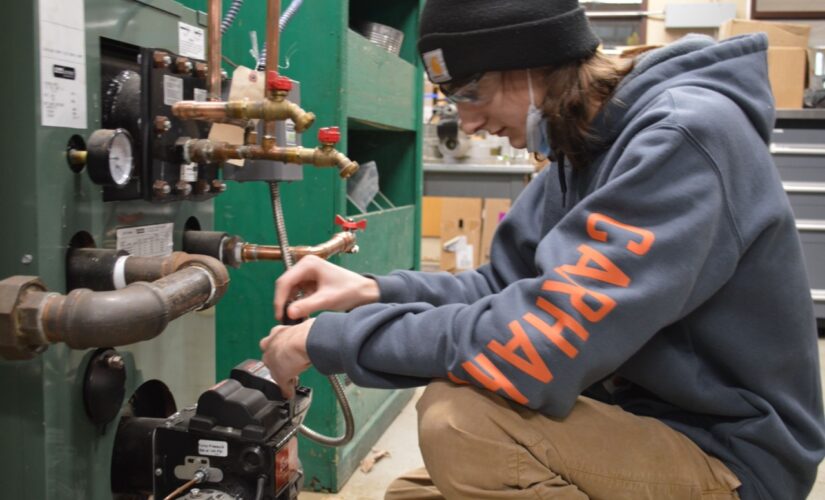Heating, Ventilation, Air Conditioning & Refrigeration
(47 .0201)
Program Description
HVAC_EssentialSkills_Chart_2022
This is an instructional program that prepares individuals to apply technical knowledge and skills to install, repair and maintain commercial and domestic heating, air conditioning and refrigeration systems. Instruction includes theory and application of basic principles involved in conditioning of air (cooling and heating); filtering and controlling humidity; operating characteristics of various units and parts; blueprint reading; use of technical reference manuals; the diagnosis of malfunctions; overhaul, repair and adjustment of units and parts such as pumps, compressors, valves, springs and connections; and repair of electric, electronic and pneumatic control systems. Technicians often specialize in either installation or maintenance and repair, although they are trained to do both. They also may specialize in heating, air conditioning or refrigeration work. Many technicians specialize in one type of equipment. Technicians may also sell service contracts to their clients. Service contracts provide for regular maintenance of the heating and cooling systems and help to reduce the seasonal fluctuations of this type of work. Refrigeration mechanics install, service, and repair industrial and commercial refrigerating systems and a variety of refrigeration equipment. They follow blueprints, design specifications, and manufacturers’ instructions to install motors, compressors, condensing units, evaporators, piping, and other components. Technicians may work outdoors or indoors, in awkward or cramped positions and in high places. Hazards include electrical shock, burns, muscle strains, and other injuries from handling heavy equipment. Appropriate safety equipment is necessary when handling refrigerants because contact can cause skin damage, frostbite, or blindness. Also, inhalation of refrigerants when working in confined spaces is a possible hazard. Individuals completing this program may be employed as service technicians, installers, refrigeration operators, and service mechanics. The majority of mechanics and installers work a 40 hour week. During peak seasons, they often work overtime or irregular hours. Maintenance workers, including those who provide maintenance services under contract, often work evening or weekend shifts and are on call. Many technicians train through apprenticeships. In addition to understanding systems, technicians must learn refrigerant products and the legislation and regulations that govern their use. Applicants for apprenticeships must have a high school diploma or equivalent. After completing an apprenticeship program, technicians are considered skilled trades workers and capable of working alone. These programs are also a pathway to certification and, in some cases, college credits. High school courses in shop math, mechanical drawing, applied physics and chemistry, electronics, blueprint reading, and computer applications provide a good background for those interested in entering this occupation. Math and reading skills are essential. Many secondary and postsecondary technical and trade schools, junior and community colleges, and the U.S. Armed Forces offer six month to two year programs in heating, air conditioning, and refrigeration.
Student Certifications may include:
- OSHA 10 hour
- NORA
- EPA
- NOCTI
- ICE
